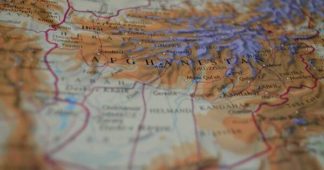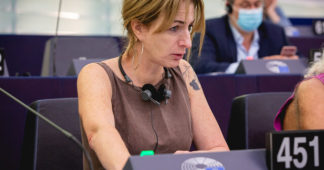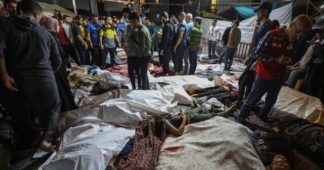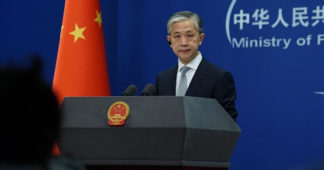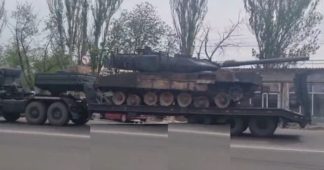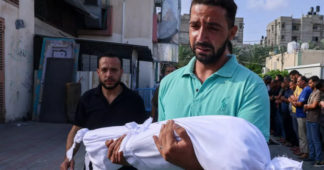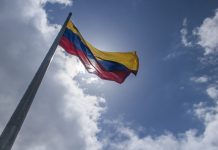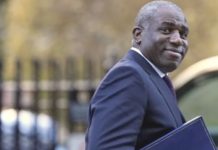By Barış Demir
A Turkish court announced its verdict Thursday in the “Kobane case.” 108 Kurdish politicians, 18 of them imprisoned, are on trial over mass protests in Turkey in 2014 in which at least 37 people were killed.
The court handed down heavy prison sentences to politicians, including former co-chairs of the Kurdish nationalist Peoples’ Democratic Party (HDP). 24 defendants were sentenced to a total of 408 years in prison on various charges.
The verdict on the case came after a meeting between opposition Republican People’s Party (CHP) leader Özgür Özel and President Recep Tayyip Erdoğan on May 2, after which Erdoğan implied a period of “political détente.” Recently, 50 people were arrested while trying to celebrate May Day in Taksim Square in Istanbul. Five of them were arrested because they had previously taken part in a protest against the government’s cooperation with Israel, which is committing genocide in Gaza.
HDP’s former leader Selahattin Demirtaş, who has been imprisoned since 2016, was sentenced to 42 years in prison on charges including “helping to destroy the unity and integrity of the state” and “incitement to commit crimes.” Former HDP co-chair Figen Yüksekdağ was sentenced to 30 years and three months. Both were ordered to remain in custody.
Ahmet Türk, former deputy and elected mayor of Mardin Metropolitan Municipality in the last local elections, was sentenced to 10 years for “membership in an armed terrorist organization,” former HDP deputy Ayla Akat Ata was sentenced to nine years and nine months, former HDP deputy Emine Ayna to 10 years, and former party deputies Ayşe Yağcı and Aynur Aşan to nine years each.
In a statement, the People’s Equality and Democracy Party (DEM Party, formerly HDP) said, “The sentences given to our friends held hostage in the Kobane conspiracy case cannot deter us. Those who strike a blow at democratic politics should know that we will defeat your conspiracies.”
CHP leader Özel said after the verdict that it was a “political case,” while Kemal Kılıçdaroğlu, who led the CHP’s support for the jailing of HDP deputies after 2016, hypocritically condemned the verdict on Twitter.
Following the court decision meetings, demonstrations and marches were banned in many cities, including Bitlis, Diyarbakır, Mardin, Tunceli, Batman, Siirt, Bingöl, Ağrı, Şırnak, Muş, Hakkari, Adana, Kars and İzmir.
The court ruled that Kurdish politicians were not responsible for the deaths that occurred during the protests. This is an admission that the long prison sentences were politically motivated.
This verdict is the latest round of escalating state repression following the collapse of the “peace process” between the Turkish state and the outlawed Kurdistan Workers’ Party (PKK) in 2015. This period has been marked mainly by the US-NATO regime-change war to overthrow Syrian President Bashar al-Assad, backed by Russia and Iran.
In this reactionary war, Ankara has played a critical role in supporting a vast network of CIA-backed jihadist terrorist groups along the Turkish-Syrian border. As a result of this murderous policy, al-Qaeda-linked organizations, including the Islamic State of Iraq and Syria (ISIS) have become a major proxy force in a war for regime change that has claimed hundreds of thousands of lives.
The “peace process” negotiations between the PKK and the Turkish ruling elite, who were seeking to advance their own interests by participating in this onslaught led by the NATO powers in the Middle East, were based on this imperialist intervention.
With the escalation of the imperialist proxy war, the PKK’s Syrian sister party, the Democratic Union Party (PYD), and its armed wing, the People’s Protection Units (YPG), have emerged as the dominant force in northern Syria.
The Erdoğan government expected Washington to intervene directly in the Syrian war in support of its Islamist proxies and planned to commit its own ground troops.
In the same year, the ISIS launched an invasion from Syria into Iraq, threatening Washington’s puppet government in the country and leading to a new NATO intervention. This led to a change in US policy toward Syria, upsetting the calculations of the Erdoğan government.
As the YPG became the main US proxy force in Syria, Ankara become terrified by the prospect of a Washington-backed Kurdish state on Turkey’s southern border, which could encourage similar sentiments among Kurds in Turkey.
The ISIS military offensive on PYD/YPG-controlled Kobani in September 2014 was a major turning point. During that period, the Erdoğan government was still in talks with the PYD/YPG and the PKK. In early October 2014, PYD leader Salih Muslim was officially received in Ankara. HDP leader Demirtaş called for Ankara and the PYD to work together under the US-led “anti-ISIS coalition.”
The HDP has been demanding the opening of a corridor to Kobane through Turkish territory to allow military aid to reach the town from other areas in northern Syria and the Iraqi Kurdistan Regional Government (KRG).
Backing the jihadist forces in the Free Syrian Army, Ankara has opposed any policies that would strengthen the Kurdish nationalists and pushed for a NATO intervention in which the Turkish army would participate to secure the interests of the Turkish ruling class in Syria.
On October 6, 2014, the HDP headquarters called for mass protests over the situation of Kobane. In response, mass demonstrations began across Turkey, especially in Kurdish cities.
Erdoğan declared, “If there is no cooperation on the ground with those who are conducting ground operations, this will not end with airstrikes [against the ISIS by the US-led coalition air forces]. Months have passed and there is no result. Right now, Ayn-el Arab, also known as Kobane, is falling.”
By October 8, this statement escalated the violence of the demonstrations. Protesters confronted security forces and supporters of the radical Islamist Free Cause Party (Hüda-Par), which was close to the government and mainly organized in Kurdish provinces.
According to the authorities, 37 people died in incidents in 35 provinces and 96 districts. The Human Rights Association (İHD) in Turkey said 46 people died between October 7 and 12, 2014.
On October 20, 2014, Ankara allowed Peshmerga forces to cross into Kobane via Turkey.
In the aftermath of these events, Erdogan declared his government’s opposition to the creation of a Kurdish enclave in northern Syria. Inside Turkey, the security forces launched military operations against the PKK militias, including in urban and town centers, aiming to destroy the entire military assets of the Kurdish nationalists. During these operations in 2015-2016, thousands of people were killed or injured and hundreds of thousands of civilians were displaced in many Kurdish cities and towns.
This was followed by a wave of state repression and arrests of Kurdish politicians. The CHP backed this crackdown.
According to a report released by the DEM Party in last December, at least 22,818 party members have been detained since 2015. Over 4,300 have been arrested, including co-chairs, deputies, provincial and district co-chairs, party officials, and members.
The report stated that 93 co-mayors elected on March 30, 2014, were arrested and trustees were appointed in 95 municipalities; 43 co-mayors elected on March 31, 2019, were arrested and trustees were appointed in 48 municipalities. Currently 17 co-mayors, seven deputies and 14 members of the party leadership are in jail.
We remind our readers that publication of articles on our site does not mean that we agree with what is written. Our policy is to publish anything which we consider of interest, so as to assist our readers in forming their opinions. Sometimes we even publish articles with which we totally disagree, since we believe it is important for our readers to be informed on as wide a spectrum of views as possible.
